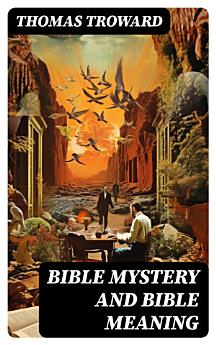Bible Mystery and Bible Meaning
Thomas Troward
dec. 2023 · DigiCat
Carte electronică
176
Pagini
family_home
Eligibilă
info
reportEvaluările și recenziile nu sunt verificate Află mai multe
Despre această carte electronică
In "Bible Mystery and Bible Meaning," Thomas Troward delves into the intricate relationship between biblical texts and the metaphysical concepts that underpin them. Through an analytical lens, Troward employs a uniquely elaborate literary style, marrying theological insights with philosophical inquiry. His work transcends traditional biblical interpretation, inviting readers to fathom deeper meanings embedded within scriptural narratives and exploring the Bible's cohesive themes of spirituality and human experience. With a rich historical context reflecting the early 20th century's fascination with mysticism and New Thought philosophy, Troward's treatise illuminates the transformative power of understanding biblical allegories. Thomas Troward, an influential figure within the New Thought movement, was renowned for his insights into the laws of mind and consciousness. His background as a district judge in India exposed him to diverse cultures and spiritual traditions, which profoundly shaped his understanding of religious texts. Troward's commitment to revealing the universal truths within the Bible culminated in this seminal work, establishing him as a bridge between scientific inquiry and spiritual exploration. "Bible Mystery and Bible Meaning" is a compelling read for anyone seeking to deepen their spiritual understanding or to explore the interconnectedness of faith and reason. Troward's eloquent discourse not only enriches one's perspective on biblical literature but also invites readers to engage in profound personal reflection, making this book a valuable asset for scholars, spiritual seekers, and readers alike.
Despre autor
Thomas Troward (1847–1916) was an influential figure in the New Thought movement, an early 20th-century spiritual philosophy that emphasized the power of the mind in shaping reality. Born in Punjab, British India, Troward drew upon his diverse background, which included serving as a Divisional Judge in British-administered India, to develop his unique perspectives on mental science and spiritual laws. Troward's literary oeuvre is substantial, with texts that delve into metaphysics and the practical applications of mental and spiritual principles. His seminal work, 'Bible Mystery and Bible Meaning' (1913), is a profound exploration of biblical texts, where Troward interprets scripture through a metaphysical lens, seeking to reconcile modern science with ancient wisdom. He posited that the Bible's teachings, when properly understood, revealed universal principles that could lead to spiritual enlightenment and personal growth. Troward's literary style is characterized by a scholarly and contemplative approach, which enables readers to grasp the complex interrelationships between thought, faith, and manifestation. His writings have been instrumental in shaping contemporary spiritual thought and continue to inspire those seeking a deeper understanding of the mind's power.
Evaluează cartea electronică
Spune-ne ce crezi.
Informații despre lectură
Smartphone-uri și tablete
Instalează aplicația Cărți Google Play pentru Android și iPad/iPhone. Se sincronizează automat cu contul tău și poți să citești online sau offline de oriunde te afli.
Laptopuri și computere
Poți să asculți cărțile audio achiziționate pe Google Play folosind browserul web al computerului.
Dispozitive eReader și alte dispozitive
Ca să citești pe dispozitive pentru citit cărți electronice, cum ar fi eReaderul Kobo, trebuie să descarci un fișier și să îl transferi pe dispozitiv. Urmează instrucțiunile detaliate din Centrul de ajutor pentru a transfera fișiere pe dispozitivele eReader compatibile.








